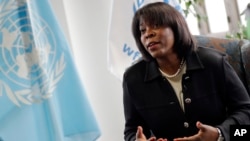The outgoing head of the United Nations' World Food Program said Monday she is certain the U.S. Congress will reject the Trump administration's proposed budget cuts for U.N. aid agencies, saying "No one in America believes that 'America First' means that other people must die.''
Executive Director Ertharin Cousin, whose friendship with former President Barack Obama predated his presidency, on Tuesday winds up five years of leading the world's largest anti-hunger humanitarian organization. The Trump administration tapped former South Carolina Gov. David Beasley to replace her, and U.N. officials appointed him last week.
In a blunt interview on the eve of her departure, Cousin joined Congressional Democrats and Republicans in criticizing the administration's proposal to reduce funding for the State Department and U.S. Agency for International Development by roughly 31 percent in the next fiscal year. Congress, in negotiation with the administration, has the final say on the budget.
"I sincerely believe that no American wants to see images of starving babies,'' Cousin said.
The United States is the largest contributor to the World Food Program, which serves some 80 million needy people with emergency food aid and other food assistance in conflict zones, refugee camps and natural disasters around the world.
The amount of money the administration has proposed for the food program hasn't been released. The WFP enjoys bipartisan support in Congress, suggesting it won't be as deeply cut as other U.N. programs.
But Cousin, who was Obama's ambassador to the U.N.'s three food agencies before she was named to lead WFP, was clear that the White House's proposal was inadequate and contrary to U.S. interests in her view.
"The budget that has been suggested by the administration does not reflect the generosity of the American people,'' she said. "I'm hopeful that the administration will recognize that the security of the United States is directly related'' to ensuring food security and development opportunities for poor people around the world.
"The policies of the Obama administration will reflect that they 'got' that,'' Cousin added. "The policies of the Trump administration would suggest that they don't believe that that is the case.''
The U.S. has provided the program with $2 billion a year for the past three years, more than Germany, Britain, Canada and Japan combined. The WFP contributions are voluntary, unlike the assessed contributions the U.S. is billed for the U.N.'s general and peacekeeping budgets.
Cousin said Germany and the European Union have already stepped in to increase their voluntary contributions, as has the private sector.
"But that does not fill the gap of a significant reduction in U.S. contributions,'' she said. "However, I do not believe at this point that this Congress will pass legislation where babies begin to die. I don't think the American people will allow it. And that is what will happen.''
The United Nations has warned that the world is facing the largest humanitarian crisis since the U.N. was founded in 1945, with more than 20 million people in four countries facing possible famine: South Sudan, Somalia, Yemen and northeast Nigeria. Already, famine has been declared in parts of South Sudan.
"No one in America believes that 'America First' means that other people must die,'' she said.
Cousin said she plans to remain engaged in food security, access to clean water and related issues when she takes up a position as lecturer and visiting fellow at Stanford University starting in September.





